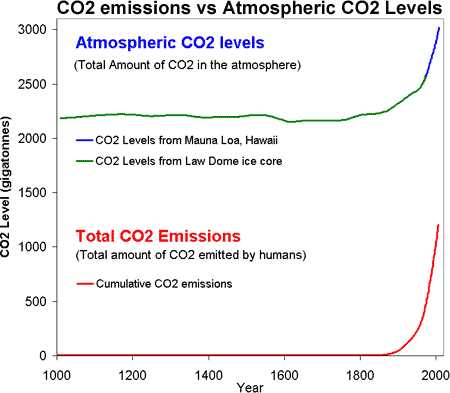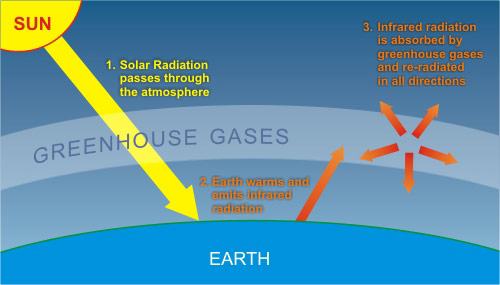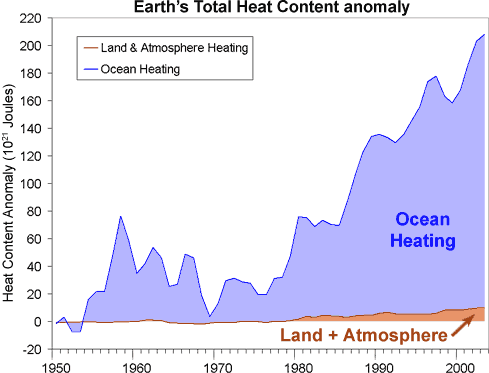Empirical evidence that humans are causing global warming
Posted on 15 October 2009 by John Cook
It still surprises me when I hear skeptics claim there is no evidence that we're causing global warming. The evidence is there in the peer reviewed literature. What they're really saying is they haven't bothered to look. So to make things easier for everyone, here is the evidence that humans are causing global warming. It's not based on theory, climate models, faith or political ideology but on direct, empirical observations. The line of evidence is as follows:

Humans are raising CO2 levels
Is it arrogant to claim we humans could possibly affect something as large as the global climate? It's not a question of arrogance. It's merely a question of numbers.
The first measurements of atmospheric CO2 were conducted by Charles Keeling in 1958 at Mauna Loa, Hawaii. Currently, atmospheric CO2 levels are being measured at hundreds of monitoring stations across the globe. For periods before 1958, CO2 levels are determined from analyses of air bubbles trapped in polar ice cores.
In pre-industrial times, CO2 has been relatively stable at around 260 to 285 ppm. Over the last 250 years, atmospheric CO2 levels have increased by about 100ppm. Currently, the amount of CO2 in the atmosphere is increasing by 15 gigatonnes every year.
We can calculate how much CO2 we're emitting from international energy statistics, tabulating coal, brown coal, peat, crude oil and cement production by nation and year. What we find is fossil fuel emissions have continued to increase. In 2008, we were emitting CO2 at a rate of 29 gigatonnes per year.

Figure 1: CO2 levels (Law Dome ice core and Mauna Loa, Hawaii) and Cumulative CO2 emissions (CDIAC).
Humanity is emitting nearly twice as much CO2 as ends up remaining in the atmosphere. Oceans and plants are actually reducing our impact on climate by absorbing a large portion of our CO2 emissions. Our actions are having a significant impact on the composition of our atmosphere. It's not arrogant to say we can change global climate. On the contrary, the arrogance lies in thinking we can act as we like without consequences.
CO2 traps heat
How does CO2 trap heat? Sunlight passes through our atmosphere and warms the earth. The earth cools by emitting infrared radiation back towards space. As infrared radiation travels through the atmosphere, some is absorbed by greenhouse gases such as water vapour and CO2. This warms the atmosphere which then reradiates the infrared radiation in all directions. Some escapes to space while some radiates downwards and further warms the Earth.

With more CO2 in the air, we expect to see less infrared radiation escaping out to space. To confirm this, satellite readings of outgoing radiation in 1970 were compared to measurements made from 1996 through to 2006 (Harries 2001, Griggs 2004, Chen 2007). They found a drop in outgoing radiation at the wavelengths that CO2 absorbs energy, consistent with theoretical expectations, thus finding "direct experimental evidence for a significant increase in the Earth's greenhouse effect".
Ground measurements also find an increase of infrared radiation heading back down towards Earth, confirmation of an enhanced greenhouse effect (Philipona 2004, Puckrin 2004, Wild 2008, Wang 2009). By closely analysing the changes at different wavelengths, scientists can calculate how much each greenhouse gas contributes to the warming effect. The results are consistent with both theory and satellite measurements of the enhanced greenhouse effect, leading the authors to conclude that "this experimental data should effectively end the argument by skeptics that no experimental evidence exists for the connection between greenhouse gas increases in the atmosphere and global warming." (Evans 2006)
Our planet is accumulating heat
We know we're raising CO2 levels. We have proof that more CO2 causes an enhanced greenhouse effect. What is the result? When you add up all the heat accumulating in the oceans, land and atmosphere plus all the energy required to melt glaciers and ice sheets, you find that the planet is accumulating heat at a rate of 190,260 GigaWatts (Murphy 2009). Considering a typical nuclear power plant has an output of 1 GigaWatt, imagine 190,000 nuclear power plants pouring their energy output directly into heating our land and oceans, melting ice and warming the air.

Figure 3: Total Earth Heat Content from 1950 (Murphy 2009).
What about claims that it hasn't warmed since 1998. Could we be experiencing global cooling? Not at all. How do we know? Think about what global warming really is. The planet is accumulating heat. More energy is coming in than is going out. Is this energy imbalance still occuring?
To answer this question, think about where most of global warming goes? Around 95% goes into warming the oceans. Measurements of ocean heat content find a warming trend through to the end of 2008 (Schuckmann 2009). There's strong evidence that the oceans are still accumulating heat. Global warming is still happening.

Figure 3: Time series of global mean heat storage (0–2000 m), measured in 108 Jm-2.
So why have we experienced surface cooling in recent years? It's not unusual or unprecedented for surface temperatures to show cooling over short periods. As the ocean contains much more heat than the atmosphere, relatively small exchanges of heat between the ocean and air can cause significant changes in surface temperature.
In 1998, we experienced the strongest El Niño on record. This moved massive amounts of heat from the Pacific Ocean into the atmosphere, leading to an abnormally warm year. Conversely, the last few years have seen the strongest La Niña conditions in over 20 years which had a cooling effect on global temperatures. It's not unusual or unprecedented for surface temperatures to show short term cooling during a long term warming trend.
So we have a clear line of evidence. Our CO2 emissions far outstrip the observed rise in CO2 levels. Surface and satellite observations confirm an enhanced greenhouse effect. And ocean heat observations tell us the planet is accumulating heat. Science tells us we need to reduce our CO2 emissions to stop global warming. But like any issue, we'll never come close to resolving it unless we admit there is a problem.
NOTE: There is a more detailed, technical version of this post for the more eggheaded readers. This post was written as part of Blog Action Day.































 Arguments
Arguments






























The real problem with this great hypotheses is that has no experimental proofs. It's any better than Henrik Svensmark's hypotheses for the influence of the cosmic rays in the cloud formation, in fact is worse than Svensmark's hypotheses because the CO2 domiance doesn't explain how our glacial eras existed. I like to think of this CO2 hypotheses as the Newton's theory for gravity, it works kind well when we discribe punctual phenomena but is not good if we look at the hole picture, but Svensmark's hypotheses is more like Einstein's relativity theory, because it is more dynamic and takes into account the influence of the hole Milky Way through our hole Solar System, instead of think of it as one isolated point that doesn't interact with anything. Fortunately it is science and it needs to be proved, but to claim that CO2 cause global warming without any experimental proof it's either not science or at least very irresponsable.
[PS] Scientific verification is taking hypothesis/model and comparing prediction against observation. This article has many such verifications. Perhaps you should actually read the linked papers? Perhaps you could explain what you mean by the strange statement" the CO2 domiance doesn't explain how our glacial eras existed."?? This makes no sense - climate theory is entirely consistent with glacial eras. Perhaps read the articles here and here?
jpalombarini @69, the emperical evidence that there is a greenhouse effect is the fact that the IR emission to space from the Earth is significantly distorted from that of a black body, and more importantly, from that of the surface - as shown in this graph from a 1970 paper:
(Details here, particularly the last two sections).
Since 1970 numerous observations have shown the same effect, and provided detailed confirmation of the theory:
Caption: Figure 1. Scatterplot of 134,862 measured values of OLR against OLR calculated by the Fu-Liou model, both in units of W/m2. The solid line is the one-to-one line. (Details)
Were you claim "there are no experimental proofs" there are in fact well over 130,000 direct observations showing unequivocally that it exists. Further, that is no surprise given that its existence is a directly predicted consequence of the laws of radiation together with the laws of thermodynamics and the composition of the Earth's atmosphere. Claims that "there are no experimental proofs" of the existence of the greenhouse effect fall into the same category as claims that "there is no experimental proof" that the Earth orbits (a point within the surface of) the Sun.
jpalombarini @69.
The analogies you present to explain yourself are as dire as your understanding of the operation of greenhouse gases.
Newton's laws act across the entire known universe so do indeed apply to "the whole picture." You are wrong to assert otherwise. The failing of Newton's laws is solely that they need amending in certain circumastances, eg by relativity when speeds or accelerations are high.
Your suggestion that Svensmark's hypothesising in some way over-rules greenhouse gas physics is most odd. The exotic nature of cosmic rays has no impact on the evaluation of the physics. And the science you place such faith in shows "that cosmic rays play a minor role in cloud formation, and have not contributed in any significant way to the global warming over the past 50 years," to quote another SkS article you would do well to read.